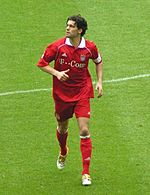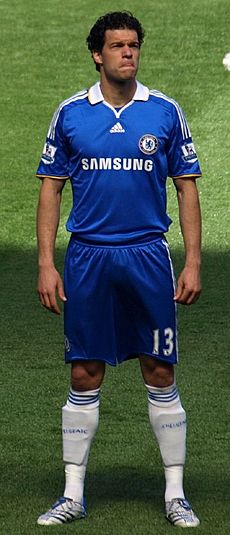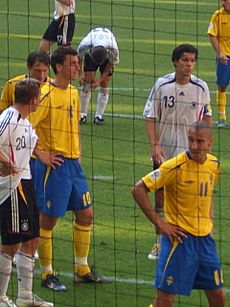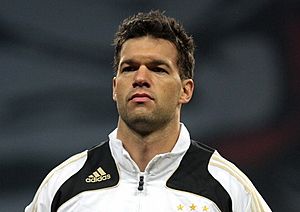Michael Ballack facts for kids
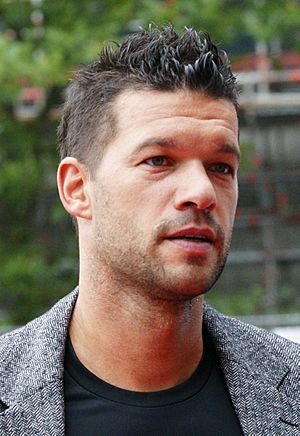
Ballack in 2014
|
|||||||||||||||||||||||||||||||
| Personal information | |||||||||||||||||||||||||||||||
|---|---|---|---|---|---|---|---|---|---|---|---|---|---|---|---|---|---|---|---|---|---|---|---|---|---|---|---|---|---|---|---|
| Full name | Michael Ballack | ||||||||||||||||||||||||||||||
| Date of birth | 26 September 1976 | ||||||||||||||||||||||||||||||
| Place of birth | Görlitz, East Germany | ||||||||||||||||||||||||||||||
| Height | 1.88 m (6 ft 2 in) | ||||||||||||||||||||||||||||||
| Position(s) | Midfielder | ||||||||||||||||||||||||||||||
| Youth career | |||||||||||||||||||||||||||||||
| 1983–1988 | BSG Motor "Fritz Heckert" Karl-Marx-Stadt | ||||||||||||||||||||||||||||||
| 1988–1995 | Chemnitzer FC | ||||||||||||||||||||||||||||||
| Senior career* | |||||||||||||||||||||||||||||||
| Years | Team | Apps | (Gls) | ||||||||||||||||||||||||||||
| 1995–1997 | Chemnitzer FC II | 18 | (5) | ||||||||||||||||||||||||||||
| 1995–1997 | Chemnitzer FC | 49 | (10) | ||||||||||||||||||||||||||||
| 1997–1998 | 1. FC Kaiserslautern II | 17 | (8) | ||||||||||||||||||||||||||||
| 1997–1999 | 1. FC Kaiserslautern | 46 | (4) | ||||||||||||||||||||||||||||
| 1999–2002 | Bayer Leverkusen | 79 | (27) | ||||||||||||||||||||||||||||
| 2002–2006 | Bayern Munich | 107 | (44) | ||||||||||||||||||||||||||||
| 2006–2010 | Chelsea | 105 | (17) | ||||||||||||||||||||||||||||
| 2010–2012 | Bayer Leverkusen | 35 | (2) | ||||||||||||||||||||||||||||
| Total | 456 | (117) | |||||||||||||||||||||||||||||
| International career | |||||||||||||||||||||||||||||||
| 1996–1998 | Germany U21 | 19 | (7) | ||||||||||||||||||||||||||||
| 1999–2010 | Germany | 98 | (42) | ||||||||||||||||||||||||||||
|
Medal record
|
|||||||||||||||||||||||||||||||
| *Club domestic league appearances and goals | |||||||||||||||||||||||||||||||
Michael Ballack (born 26 September 1976) is a famous German former footballer. He was known for his strong shots, great passing, and powerful presence in the middle of the field. Many people consider him one of the best midfielders of his time.
Ballack was chosen by the legendary player Pelé as one of FIFA's 100 Greatest Living Players. He also won the UEFA Club Midfielder of the Year award in 2002. He was named German Footballer of the Year three times: in 2002, 2003, and 2005.
He started his career in youth teams in Germany. He then played for several top clubs like Chemnitzer FC, 1. FC Kaiserslautern, Bayer Leverkusen, Bayern Munich, and Chelsea. Ballack won many trophies with these clubs, including league titles and cups. He also played a big role for the German national team, leading them as captain in major tournaments.
Contents
Early Life and Youth Football
Michael Ballack was born on 26 September 1976 in Görlitz, a town in East Germany. He was the only child of Stephan and Karin Ballack. His family moved to Chemnitz when he was very young. This is where he began his football journey.
At age seven, Ballack started training with a local sports club. His coach, Steffen Hänisch, was very impressed by his skills. Michael could shoot well with both feet, which was unusual for his age. He then joined the youth academy of Chemnitzer FC in 1988. His father had also played football at a high level in Germany.
Club Career Highlights
Starting at Chemnitzer FC
In 1995, Ballack signed his first professional contract. He played as a central midfielder and was nicknamed "Little Kaiser." This was a reference to the famous German player Franz Beckenbauer. Ballack made his professional debut on 4 August 1995. His team, Chemnitz, was relegated to a lower division that season.
However, Ballack became a regular player the next season. He scored ten goals and showed great potential. In the summer of 1997, Otto Rehhagel, the coach of 1. FC Kaiserslautern, signed him.
Success with 1. FC Kaiserslautern
Ballack made his first appearance in the Bundesliga in September 1997. He came on as a substitute for the last five minutes of a game. On 28 March 1998, he started his first game for Kaiserslautern.
In his first season, Ballack played 16 games. His team made history by becoming the first newly promoted club to win the Bundesliga title. The next season, he became a key player, making 30 appearances and scoring 4 goals. Kaiserslautern also reached the quarter-finals of the UEFA Champions League.
Making a Name at Bayer Leverkusen
In 1999, Ballack moved to Bayer Leverkusen. This is where he truly became a star. His coaches gave him an attacking role in midfield. Ballack scored 27 league goals and 9 goals in European competitions during his three seasons there.
The 2001–02 season was a mix of success and heartbreak for Leverkusen. They finished second in the Bundesliga, the DFB-Pokal, and the UEFA Champions League. This triple runner-up finish earned them the nickname "Neverkusen." Ballack also played in the 2002 FIFA World Cup Final with Germany, where they lost to Brazil. Despite the near misses, Ballack was voted German Footballer of the Year for his amazing performance.
Dominating with Bayern Munich
In 2002, Ballack joined Bayern Munich. He quickly helped them win the Bundesliga and DFB-Pokal in his first season. They repeated this "double" win in 2005 and 2006. Ballack became a top goalscorer from midfield, scoring 58 goals for Bayern between 2002 and 2006.
He won three Bundesliga titles and three DFB-Pokal cups with Bayern. However, some critics felt he didn't always perform his best in big Champions League matches.
Joining Chelsea in England
In 2006, Ballack moved to the English club Chelsea on a free transfer. He was given his favorite number 13 shirt. He made his Chelsea debut on 31 July 2006. On 12 September, he scored his first goal for Chelsea in the UEFA Champions League.
In his first season, he won the League Cup and the FA Cup with Chelsea. He scored eight goals in all competitions. In the 2007–08 season, Ballack helped Chelsea reach their first-ever Champions League final. However, they finished as runners-up in the League Cup, Premier League, and Champions League. This was another "treble horror" for Ballack.
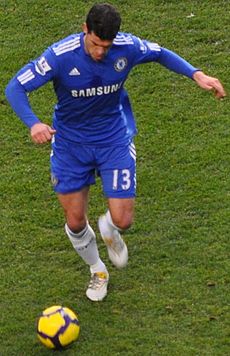
He continued to score important goals for Chelsea. In the 2008–09 season, he helped Chelsea win the FA Cup again. In the 2009–10 season, Chelsea won the Premier League title, which was Ballack's first league title in England. They also won the FA Cup again, completing a league and cup "double."
Ballack left Chelsea in June 2010 after his contract ended. He had a great record, losing only 10 of his 105 Premier League appearances.
Returning to Bayer Leverkusen
On 25 June 2010, Ballack signed a two-year contract to return to his former club, Bayer Leverkusen. He scored his first goal back at Leverkusen in a UEFA Europa League qualifier. Unfortunately, he suffered a shin injury in September 2010, which kept him out for the rest of that year.
He returned to play in February 2011. He scored more goals in the Europa League and helped Leverkusen reach the round of 16.
Retirement from Football
Michael Ballack announced his retirement from professional football on 2 October 2012. He had been considering offers from clubs in other leagues but decided to end his playing career.
On 5 June 2013, Ballack played a special farewell match in Leipzig. Many of his former teammates and famous football players joined him. These included Lothar Matthäus, Didier Drogba, Miroslav Klose, and Andriy Shevchenko. Even Formula 1 racing driver Michael Schumacher participated. The teams were coached by his former managers, José Mourinho and Rudi Völler.
International Career for Germany
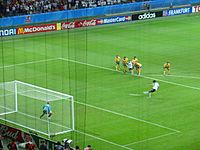
Ballack first played for the German under-21 team in March 1996. He played 19 matches for them, scoring four goals. His first game for the senior German national team was on 28 April 1999.
In the 2002 FIFA World Cup, Ballack scored important goals in the knockout rounds. He helped Germany reach the final. However, he received a yellow card in the semi-final, which meant he was suspended for the final match. Germany lost the final to Brazil. Ballack was still named in the World Cup All-Star Team.
After UEFA Euro 2004, Jürgen Klinsmann became the national team coach, and Ballack was made captain. He scored three penalty goals in the 2005 FIFA Confederations Cup, where Germany finished third.
In the 2006 FIFA World Cup, Ballack played in five matches. Germany reached the semi-finals and then secured third place. He was named Man of the Match in two games and was again included in the World Cup All-Star Team.
Ballack captained Germany in UEFA Euro 2008. He scored a free kick against Austria to help Germany reach the quarter-finals. He also scored a header against Portugal in the quarter-finals. Germany made it to the final but lost 1–0 to Spain. Ballack was named in the Team of the Tournament.
He scored four goals in the 2010 World Cup qualifiers. However, he missed the 2010 FIFA World Cup due to an ankle injury he got in the 2010 FA Cup Final. Germany played well without him, finishing third in the tournament.
In June 2011, it was announced that Ballack would no longer be part of the national team. He was offered two friendly games to reach 100 matches for Germany, but he declined. He felt that the invitation was disrespectful after his injury. Ballack later organized his own farewell game, inviting many famous players and coaches.
How Michael Ballack Played
Michael Ballack is known as one of the best and most flexible midfielders of his time. He usually played in the center of the field, covering both defense and attack. He was famous for his powerful shots with both feet. Because he was tall, he was also very good at heading the ball, especially during corner kicks and free kicks. He was also great at running into the penalty area at just the right moment to score.
Ballack was a strong, aggressive player with excellent passing skills. He moved the ball well and could create many scoring chances for his team. He started his career as a defender, but his coaches at Leverkusen moved him to midfield, where he truly shined. He could also play in a deeper, more defensive role when needed. Ballack was a strong tackler and had great stamina. All these skills made him a "complete midfielder." Beyond his playing ability, he was also a strong leader on the field.
Personal Life
Michael Ballack's family name comes from the Sorbian people. His father, Stephan, was an engineer who played football in a lower division. His mother, Karin, was a secretary and a swimmer.
On 14 July 2008, Ballack married his long-time girlfriend, Simone Lambe. They had three children together: Louis, Emilio, and Jordi. The couple later divorced in 2012.
After retiring from football, Ballack worked as a football analyst for ESPN during major tournaments like the Euro 2012, 2014 World Cup, and Euro 2016.
Career Statistics
Club
| Club | Season | League | National cup | League cup | Europe | Other | Total | |||||||
|---|---|---|---|---|---|---|---|---|---|---|---|---|---|---|
| Division | Apps | Goals | Apps | Goals | Apps | Goals | Apps | Goals | Apps | Goals | Apps | Goals | ||
| Chemnitzer FC II | 1994–95 | Oberliga Nordost Süd | 7 | 2 | – | – | – | – | 7 | 2 | ||||
| 1995–96 | Oberliga Nordost Süd | 11 | 3 | – | – | – | – | 11 | 3 | |||||
| Total | 18 | 5 | 0 | 0 | 0 | 0 | 0 | 0 | 0 | 0 | 18 | 5 | ||
| Chemnitzer FC | 1995–96 | 2. Bundesliga | 15 | 0 | 1 | 0 | – | – | – | 16 | 0 | |||
| 1996–97 | Regionalliga Nordost | 34 | 10 | 1 | 0 | – | – | – | 35 | 10 | ||||
| Total | 49 | 10 | 2 | 0 | 0 | 0 | 0 | 0 | 0 | 0 | 51 | 10 | ||
| 1. FC Kaiserslautern | 1997–98 | Bundesliga | 16 | 0 | 2 | 0 | – | – | – | 18 | 0 | |||
| 1998–99 | Bundesliga | 30 | 4 | 2 | 0 | 1 | 0 | 6 | 0 | – | 39 | 4 | ||
| Total | 46 | 4 | 4 | 0 | 1 | 0 | 6 | 0 | 0 | 0 | 57 | 4 | ||
| Bayer Leverkusen | 1999–2000 | Bundesliga | 23 | 3 | 0 | 0 | 0 | 0 | 2 | 2 | – | 25 | 5 | |
| 2000–01 | Bundesliga | 27 | 7 | 2 | 0 | 1 | 0 | 5 | 2 | – | 35 | 9 | ||
| 2001–02 | Bundesliga | 29 | 17 | 4 | 0 | 1 | 0 | 16 | 6 | – | 50 | 23 | ||
| Total | 79 | 27 | 6 | 0 | 2 | 0 | 23 | 10 | 0 | 0 | 110 | 37 | ||
| Bayern Munich | 2002–03 | Bundesliga | 26 | 10 | 5 | 4 | 0 | 0 | 7 | 1 | – | 38 | 15 | |
| 2003–04 | Bundesliga | 28 | 7 | 3 | 2 | 1 | 2 | 8 | 0 | – | 40 | 11 | ||
| 2004–05 | Bundesliga | 27 | 13 | 4 | 3 | 2 | 2 | 9 | 2 | – | 42 | 20 | ||
| 2005–06 | Bundesliga | 26 | 14 | 5 | 1 | 0 | 0 | 6 | 1 | – | 37 | 16 | ||
| Total | 107 | 44 | 17 | 10 | 3 | 4 | 30 | 4 | 0 | 0 | 157 | 62 | ||
| Chelsea | 2006–07 | Premier League | 26 | 5 | 3 | 1 | 6 | 0 | 10 | 2 | 1 | 0 | 46 | 8 |
| 2007–08 | Premier League | 18 | 7 | 2 | 0 | 3 | 0 | 7 | 2 | 0 | 0 | 30 | 9 | |
| 2008–09 | Premier League | 29 | 1 | 6 | 3 | 1 | 0 | 10 | 0 | – | 46 | 4 | ||
| 2009–10 | Premier League | 32 | 4 | 4 | 1 | 2 | 0 | 6 | 0 | 1 | 0 | 45 | 5 | |
| Total | 105 | 17 | 15 | 5 | 12 | 0 | 33 | 4 | 2 | 0 | 167 | 26 | ||
| Bayer Leverkusen | 2010–11 | Bundesliga | 17 | 0 | 0 | 0 | – | 3 | 2 | – | 20 | 2 | ||
| 2011–12 | Bundesliga | 18 | 2 | 1 | 0 | – | 6 | 1 | – | 25 | 3 | |||
| Total | 35 | 2 | 1 | 0 | 0 | 0 | 9 | 3 | 0 | 0 | 45 | 5 | ||
| Career total | 439 | 109 | 45 | 15 | 18 | 4 | 101 | 21 | 2 | 0 | 605 | 149 | ||
International
| National team | Year | Apps | Goals |
|---|---|---|---|
| Germany | 1999 | 3 | 0 |
| 2000 | 9 | 0 | |
| 2001 | 9 | 6 | |
| 2002 | 11 | 6 | |
| 2003 | 5 | 2 | |
| 2004 | 13 | 8 | |
| 2005 | 11 | 7 | |
| 2006 | 14 | 6 | |
| 2007 | 2 | 0 | |
| 2008 | 12 | 4 | |
| 2009 | 8 | 3 | |
| 2010 | 1 | 0 | |
| Total | 98 | 42 | |
- Scores and results list ' goal tally first, score column indicates score after each goal.
| No. | Date | Venue | Opponent | Score | Result | Competition | Ref. |
|---|---|---|---|---|---|---|---|
| 1 | 28 March 2001 | Olympic Stadium, Athens, Greece | 2–1 | 4–2 | 2002 FIFA World Cup qualification | ||
| 2 | 2 June 2001 | Helsinki Olympic Stadium, Helsinki, Finland | 1–2 | 2–2 | 2002 FIFA World Cup qualification | ||
| 3 | 6 June 2001 | Arena Kombëtare, Tirana, Albania | 2–0 | 2–0 | 2002 FIFA World Cup qualification | ||
| 4 | 10 November 2001 | Olympic Stadium, Kyiv, Ukraine | 1–1 | 1–1 | 2002 FIFA World Cup qualification | ||
| 5 | 14 November 2001 | Westfalenstadion, Dortmund, Germany | 1–0 | 4–1 | 2002 FIFA World Cup qualification | ||
| 6 | 4–0 | ||||||
| 7 | 1 June 2002 | Sapporo Dome, Sapporo, Japan | 3–0 | 8–0 | 2002 FIFA World Cup | ||
| 8 | 21 June 2002 | Ulsan Munsu Football Stadium, Ulsan, South Korea | 1–0 | 1–0 | 2002 FIFA World Cup | ||
| 9 | 25 June 2002 | Seoul World Cup Stadium, Seoul, South Korea | 1–0 | 1–0 | 2002 FIFA World Cup | ||
| 10 | 21 August 2002 | Stadion Georgi Asparuhov, Sofia, Bulgaria | 1–1 | 2–2 | Friendly | ||
| 11 | 7 September 2002 | Darius and Girėnas Stadium, Kaunas, Lithuania | 1–0 | 2–0 | UEFA Euro 2004 qualifying | ||
| 12 | 16 October 2002 | Niedersachsenstadion, Hanover, Germany | 1–0 | 2–1 | UEFA Euro 2004 qualifying | ||
| 13 | 10 September 2003 | Westfalenstadion, Dortmund, Germany | 2–0 | 2–1 | UEFA Euro 2004 qualifying | ||
| 14 | 11 October 2003 | Volksparkstadion, Hamburg, Germany | 1–0 | 3–0 | UEFA Euro 2004 qualifying | ||
| 15 | 31 March 2004 | RheinEnergieStadion, Cologne, Germany | 3–0 | 3–0 | Friendly | ||
| 16 | 27 May 2004 | Dreisamstadion, Freiburg, Germany | 1–0 | 7–0 | Friendly | ||
| 17 | 2–0 | ||||||
| 18 | 5–0 | ||||||
| 19 | 6–0 | ||||||
| 20 | 23 June 2004 | Estádio José Alvalade, Lisbon, Portugal | 1–0 | 1–2 | UEFA Euro 2004 | ||
| 21 | 16 December 2004 | Nissan Stadium, Yokohama, Japan | 2–0 | 3–0 | Friendly | ||
| 22 | 19 December 2004 | Busan Asiad Main Stadium, Busan, South Korea | 1–1 | 1–3 | Friendly | ||
| 23 | 4 June 2005 | Windsor Park, Belfast, Northern Ireland | 2–1 | 4–1 | Friendly | ||
| 24 | 3–1 | ||||||
| 25 | 15 June 2005 | Waldstadion, Frankfurt, Germany | 3–2 | 4–3 | 2005 FIFA Confederations Cup | ||
| 26 | 18 June 2005 | RheinEnergieStadion, Cologne, Germany | 1–0 | 3–0 | 2005 FIFA Confederations Cup | ||
| 27 | 25 June 2005 | Frankenstadion, Nuremberg, Germany | 2–2 | 2–3 | 2005 FIFA Confederations Cup | ||
| 28 | 29 June 2005 | Zentralstadion, Leipzig, Germany | 4–3 | 4–3 | 2005 FIFA Confederations Cup | ||
| 29 | 17 August 2005 | De Kuip, Rotterdam, Netherlands | 1–2 | 2–2 | Friendly | ||
| 30 | 22 March 2006 | Westfalenstadion, Dortmund, Germany | 4–0 | 4–1 | Friendly | ||
| 31 | 2 June 2006 | Borussia-Park, Mönchengladbach, Germany | 1–0 | 3–0 | Friendly | ||
| 32 | 6 September 2006 | San Marino Stadium, Serravalle, San Marino | 3–0 | 13–0 | UEFA Euro 2008 qualifying | ||
| 33 | 7 October 2006 | Ostseestadion, Rostock, Germany | 2–0 | 2–0 | Friendly | ||
| 34 | 11 October 2006 | Tehelné pole, Bratislava, Slovakia | 2–0 | 4–1 | UEFA Euro 2008 qualifying | ||
| 35 | 15 November 2006 | GSP Stadium, Strovolos, Cyprus | 1–0 | 1–1 | UEFA Euro 2008 qualifying | ||
| 36 | 31 May 2008 | Veltins-Arena, Gelsenkirchen, Germany | 2–1 | 2–1 | Friendly | ||
| 37 | 16 June 2008 | Ernst-Happel-Stadion, Vienna, Austria | 1–0 | 1–0 | UEFA Euro 2008 | ||
| 38 | 19 June 2008 | St. Jakob-Park, Basel, Switzerland | 3–2 | 3–2 | UEFA Euro 2008 | ||
| 39 | 11 October 2008 | Westfalenstadion, Dortmund, Germany | 2–0 | 2–1 | 2010 FIFA World Cup qualification | ||
| 40 | 28 March 2009 | Zentralstadion, Leipzig, Germany | 1–0 | 4–0 | 2010 FIFA World Cup qualification | ||
| 41 | 1 April 2009 | Millennium Stadium, Cardiff, Wales | 1–0 | 2–0 | 2010 FIFA World Cup qualification | ||
| 42 | 9 September 2009 | Niedersachsenstadion, Hanover, Germany | 1–0 | 4–0 | 2010 FIFA World Cup qualification |
Honours and Awards
Michael Ballack won many titles and received several awards during his career:
1. FC Kaiserslautern
- Bundesliga: 1997–98 (German League Champion)
Bayer Leverkusen
- DFB-Pokal runner-up: 2001–02 (German Cup Finalist)
- UEFA Champions League runner-up: 2001–02 (European Champions League Finalist)
Bayern Munich
- Bundesliga: 2002–03, 2004–05, 2005–06
- DFB-Pokal: 2002–03, 2004–05, 2005–06
- DFB-Ligapokal: 2004 (German League Cup)
Chelsea
- Premier League: 2009–10 (English League Champion)
- FA Cup: 2006–07, 2008–09, 2009–10 (English Cup)
- Football League Cup: 2006–07 (English League Cup); runner-up: 2007–08
- FA Community Shield: 2009 (English Super Cup)
- UEFA Champions League runner-up: 2007–08
Germany National Team
- FIFA World Cup runner-up: 2002; third place: 2006
- UEFA European Championship runner-up: 2008
- FIFA Confederations Cup third place: 2005
Individual Awards
- UEFA Club Midfielder of the Year: 2002
- UEFA Team of the Year: 2002
- ESM Team of the Year: 2001–02
- Footballer of the Year (Germany): 2002, 2003, 2005
- kicker Bundesliga Team of the Season: 2001–02, 2002–03, 2004–05, 2005–06
- FIFA World Cup All-star team: 2002, 2006
- FIFA XI: 2002
- UEFA European Championship Team of the Tournament: 2004, 2008
- FIFA 100 (chosen by Pelé as one of the greatest living players)
- FIFA Confederations Cup Silver Shoe Winner: 2005
- Goal of the Year (Germany): 2008
See also
 In Spanish: Michael Ballack para niños
In Spanish: Michael Ballack para niños
 | Jackie Robinson |
 | Jack Johnson |
 | Althea Gibson |
 | Arthur Ashe |
 | Muhammad Ali |


